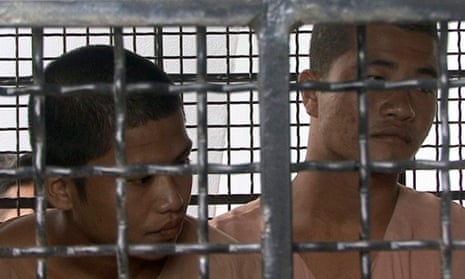Human rights activists have expressed alarm after it emerged that British police might have breached legal guidelines by providing evidence to Thai authorities which could potentially help them execute suspects accused of murdering two British backpackers.
The investigation into the deaths of Hannah Witheridge and David Miller in September on the holiday island of Koh Tao has already prompted concern following claims that the two young Burmese migrant workers arrested for the crime were tortured by Thai police to secure confessions, which they then retracted.
The suspects, Zaw Lin and Wai Phyo, both 21, face trial in July, and Thai prosecutors say they will seek the death penalty. Under a British government protocol,British police and officials should not normally provide evidence when defendants face capital punishment in a foreign jurisdiction without getting assurances a death sentence will not be carried out.
However, in an email to the rights group Reprieve, the Foreign Office (FCO) said it had learned that four English police forces conducted interviews about the case at the request of their Thai counterparts and passed on the information. Reprieve says it does not believe assurances over execution were sought. The FCO declined to comment on this point.
More widely, Reprieve claims British police and officials have been giving “one-sided assistance” by handing information to Thai authorities but refusing to share any of it with the defence team.
Witheridge, 23, was raped and beaten to death while Miller, 24, was struck on the head and left to drown in shallow surf. During a frantic two-week investigation, Thailand’s military prime minister, General Prayuth Chan-ocha, said he believed migrant workers were the culprits. Soon afterwards, two young Burmese men were arrested.
Zaw Lin and Wai Phyo said they were beaten and scalded to get confessions, while other Burmese nationals on Koh Tao said they were also mistreated by police. Amnesty International and the British government were among those who raised concerns about the inquiry.
Late last year, a Metropolitan police team was sent to Thailand to observe the case and prepare a report. In December, it told Reprieve it would not share the report with Thai police as it did “not provide information for use in a criminal process which lacks the necessary assurances about use of the death penalty”.
However, the Met said it could not account for the actions of other police forces, prompting Reprieve to seek clarification from the FCO.
The FCO response said Hampshire, Essex, Hertfordshire and Jersey police had been asked by Thai police to interview Britons who were on Koh Tao with Witheridge and Miller. It added: “We now understand that UK law enforcement colleagues shared the contents of these statements informally with Thai police after they had taken human rights considerations into account.”
Asked by the Guardian whether Britain had first sought assurances that Zaw Lin and Wai Phyo would not be executed, the FCO declined to comment on the specific point. A spokeswoman said: “We have called for the investigation to be conducted in a fair and transparent way, in line with international standards. The British government opposes the use of the death penalty and has been clear on this with the Thai government.”
Lawyers acting for Reprieve have written to the government asking what information was shared with Thai authorities and for any details about human rights assurances.
Separately, the organisation is challenging the Met’s decision to refuse the Thai defence team access to its report into the case. Lawyers for the suspects have accused British officials of complicity in denying them a fair trial; under Thai law the prosecution is not obliged to divulge its evidence in advance.
They are seeking the report under data protection laws, which the Met has refused. In a letter to the commissioner, Sir Bernard Hogan-Howe, Reprieve’s lawyers challenge this, saying the dual grounds for refusal – that police hold no personal data on the suspects and that divulging it could prejudice the trial – were contradictory.
Maya Foa, director of Reprieve’s death penalty team, said the organisation sympathised with the victim’s families, who have expressed confidence in the Thai investigation, and understood their desire to see those responsible held to account. She said: “It is therefore essential to make sure that we see a fair trial. But this can only happen if there is a level playing field.
“That is why the one-sided assistance provided to the Thai prosecutors by the UK police is so worrying – especially when they are aware that two young men could face the death penalty following torture and a deeply flawed trial.”
Hampshire police said it interviewed a witness over the case but that, as far as it knew, the information had not yet been passed on to Thai police. Jersey, Essex and Hertfordshire police referred the matter to the Met, who in turn referred it to the FCO.
The FCO said it could not assist the defence: “The evidence to be presented to the court was and remains in the possession of the Thai police and prosecutor. Decisions about what and how this will be presented at any trial are for the Thai authorities to make.
“The British government cannot interfere in Thailand’s judicial proceedings, just as other governments are unable to interfere in our own judicial processes.
